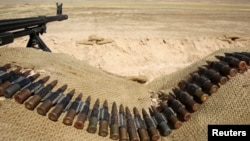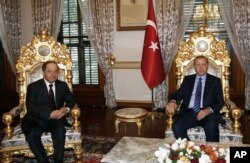Fears are growing the mountainous Iraqi Sinjar region is becoming the focal point of a proxy conflict in the region.
The conflict turned fatal earlier this month with armed clashes between rival Kurdish groups of peshmergas of the Iraqi Kurdistan Democratic Party (KDP) and Kurdistan Workers' Party- (PKK) backed forces.
Iraqi Kurdistan President Masoud Barzani has called for the removal of PKK forces, which are designated by much of the international community as a terrorist organization. The PKK has been fighting in neighboring Turkey for greater minority rights for more than three decades, but the rebels are also Barzani's rivals for influence and control of Kurds across the region.
The PKK intervened in Sinjar to protect the local Yazidi population when the Islamic State group overran the region after Barzani’s peshmergas withdrew. The jihadists killed and enslaved the local Yazidi population, calling them heretics for their Zoroastrianism-derived belief - crimes many human rights groups say are tantamount to genocide.
The PKK has trained and backs Yazidi militia in Sinjar and observers say it retains considerable local support.
Ankara is suspected of being behind this month’s inter-Kurdish clashes in Sinjar. The Turkish government has repeatedly warned it will not tolerate the presence of PKK forces in Sinjar, which is close to the Turkish border, fearing it will become a new base for operations against Turkey.
Ankara courts Barzani support
“The Kurdish leader Barzani has agreed to help and support the Turkish initiative that Sinjar should not be a base to be held by the PKK anymore,” claims Murat Bilhan, deputy chair of the Ankara-based Turkish Asian Center for Strategic Studies, “as this is not acceptable to Turkey, and Turkey has requested the support of the Barzani regime.”
Barzani visited Ankara last month, where he received unprecedented hospitality almost equivalent to a head of state, including the flying of the Iraqi Kurdish flag. The gesture provoked outrage and condemnation among Turkish nationalists, who view any such actions as steps towards recognizing an independent Kurdish state.
Even though Barzani is a frequent visitor to Turkey, having developed close ties with the ruling AK Party and President Recep Tayyip Erdogan, until now, such diplomatic gestures were avoided for fear of stirring nationalist sentiments.
The Iraqi Kurdish leader is viewed by Ankara as being key to any move against the PKK in Iraq. Analysts claim such a move is of increased urgency for Ankara given the PKK’s affiliate, the YPG in Syria, is continuing to make territorial gains, as it fights the Islamic State.
“Ankara will be looking for alternative ways to hit the PKK,” claims Aydin Selcen a former senior Turkish diplomat who served widely in the region, including in Iraqi Kurdistan, “One option, which is a very difficult one, is an operation aiming at Qandil [the PKK’s main base] in Iraq, another option is a military operation aiming at Sinjar, with directly, or indirectly, KDP peshmerga fighters and the Turkish army.”
Ankara has warned it will militarily intervene in Sinjar if the PKK is not removed.
But any operation brings considerable risk.
“It will bring Turkey into direct conflict with Shia militia and with Iraqi military and then indirectly with Iran,” warns Haldun Solmazturk, retired Turkish brigadier and now head of the Ankara-based Turkey Twenty-First Century Institute.
Ankara has accused the PKK in Sinjar of conspiring with the Iraqi Shia militia, the People's Mobilization Forces, a charge it has denied.
“Sinjar itself, it's an area where all these regional tensions converge,” observes Selcen. “There is the People's Mobilization unit nearby and we know they have close contacts if not direct contacts to Tehran, and the Baghdad army is there, also the U.S. [force] is nearby and Barzani’s forces, it’s [a] very intricate proxy conflict.”





